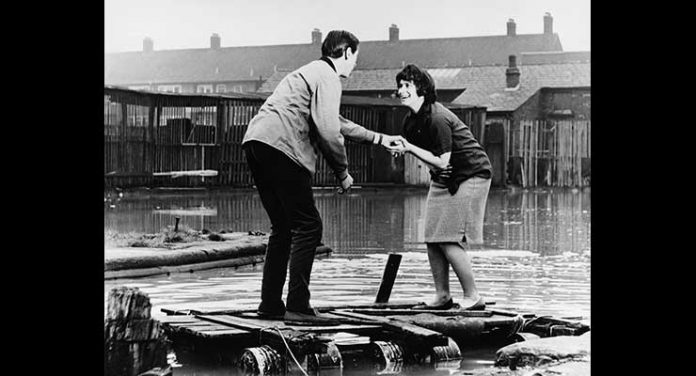
Delaney’s play (she also co-wrote the screenplay with Richardson) hits on interracial relationships, premarital sex, and homosexuality, all obvious taboos in 1961 Britain and elsewhere. In fact, before the “kitchen sink” movement, subjects like homosexuality weren’t even allowed to be brought up in British theater and if they were, they were so filtered out by the censors, that you probably wouldn’t even have realized it was. This film is notable for touching on such subjects like interracial relationships well ahead of, say, Guess Who’s Coming to Dinner? And also, even within its own so-called “kitchen sink” genre, for being centered on an “angry young woman” in Jo, rather than the “angry young man” of other films from that era like “A Look Back in Anger” or “The Loneliness of the Long Distance Runner.”
Also notable in A Taste of Honey, beyond just its working class and lower-middle class themes and Northern England characters, is the cinematography of Lancashire courtesy of British New Wave favorite Walter Lassally who provides bleak yet beautiful looks at the canals, side streets and town life of Northern England. One of the most moving moments coming when Jo watches Jimmy leaving her, for the last time, as he walks to the edge of the turn bridge, his silhouette against the industrial backdrop. This imagery, now so common, actually helped to take Delaney’s play out of its confines of rundown apartments and hotel rooms and put it in the even broader context of the deteriorating working class, industrial world outside.
[envira-album id=”91116″]
The Video
A Taste of Honey gets a new digital restoration in 4K done on a Lasergraphics Director film scanner from the original 35mm camera negative. Thousands of instances of dirt, debris, scratches, splices, and warps were manually removed using MTI Film’s DRS while DigitalVision’s Phoenix was used for jitter, flicker, small dirt, grain, and noise management. The result of the restoration process is a brilliant transfer to Blu-ray of the film preserved in its original aspect ratio of 1.66:1 and encoded in AVC at 1080p. The black and white cinematography looks beautiful and stark, with magnificent contrasts, the grain structure is crisp and organic, while detail is superb. There are only slight instances of source damage remaining, only the most egregious, like some tramlines in the final scenes that would do more harm to remove. This film looks breathtaking in this new transfer from Criterion.
The Audio
The monaural remastered from the 35mm original sound negative. The element was transferred at the British Film Institute National Archive in Berkhamstead, England using Sondor’s Resonances optical soundtrack scanner system. Digital restoration was performed by the Criterion Collection using Pro Tools HD and iZotope RX 4. The soundtrack is provided in LPCM 1.0 (48kHz/24-bit) and it is good enough given the time period and recording limitations, but given that, there isn’t much dynamic range or fullness in the sound at all and it does sound quite boxy. The volume levels are also rather low so be ready to turn this one way up to get a comfortable listening level.
The Supplements
The release is packed to the brim with on-disc extras that include a number of new and archival interviews with the actors and the director, plus a 1956 documentary by director Tony Richardson, Momma Don’t Allow.
- Booklet: The booklet may be unusually sparse for a Criterion release, but it still contains an excellent essay on the film from film scholar Colin MacCabe as well as the usual credits and information on the transfer.
- Momma Don’t Allow (1.37:1; 1080p/24; 00:21:11) – This twenty-two-minute 1956 documentary, Tony Richardson’s first theatrical film, was shot at a jazz club in North London (by A Taste of Honey cinematographer Walter Lassally) and made as part of the Free Cinema movement. Foudned by Richardson, Lindsay Anderson, and Karel Reisz, the latter of whom codirected this film, Free Cinema consisted of documentaries that were produced on small budgets outside the mainstream British film industry and depicted the everyday lives of working-class people.
- Tony Richardson (1.78:1; 1080p/24; 00:15:02) – This piece features an audio interview with screenwriter and director Tony Richardson, presented with film slips and behind-the-scenes images. The interview, conducted by film critic Gideon Bachmann at the 1962 Cannes Film Festival, covers the state of British cinema, Richardson’s approach to filmmaking, and what drew him to adapting A Taste of Honey for the screen.
- The Actors — – Rita Tushingham’s and Murray Melvin’s performances as Jo and Geoffrey in A Taste of Honey brought them international acclaim, including awards for best actress and best actor at the 1962 Cannes Film Festival. In these interviews, recorded by Criterion in London in May 2016, Tushingham and Melvin (who also originated his role in the play) discuss the film’s production.
- Rita Tushingham (1.78:1; 1080p/24; 00:18:17)
- Murray Melvin (1.78:1; 1080p/24; 00:18:38)
- Walter Lassally (1.78:1; 1080i/60 upscaled; 00:19:51) – This twenty-minute video essay from 1998 features cinematographer 2 discussing his work with director Tony Richardson and the unusual production methods of A Taste of Honey.
- Remaking British Theater (1.78:1; 1080p/24; 00:21:30) – Shelagh Delaney’s play A Taste of Honey was first produced by Joan Littlewood’s Theatre Workshop in London in 1958. In this interview, recorded by the Criterion Collection in London in May 2016, theater scholar Kate Dorney discusses the groundbreaking production and its enduring influence.
- Close-Up (1.33:1; 1080p/24; 00:15:17) – In this fifteen-minute interview excerpt, playwright Shelagh Delaney discusses growing up in Salford, England, and writing her hit play A Taste of Honey at the age of eighteen. The interview aired in 1960 on television series Close-Up.
The Final Assessment
Bleak, raw, and ahead of its time, A Taste of Honey is full of powerful performances and stark imagery. Criterion Collection’s new 4K restoration preserves the power of the film with a brilliant, filmic presentation on Blu-ray that begs to be seen.
Be the first to leave a review.


